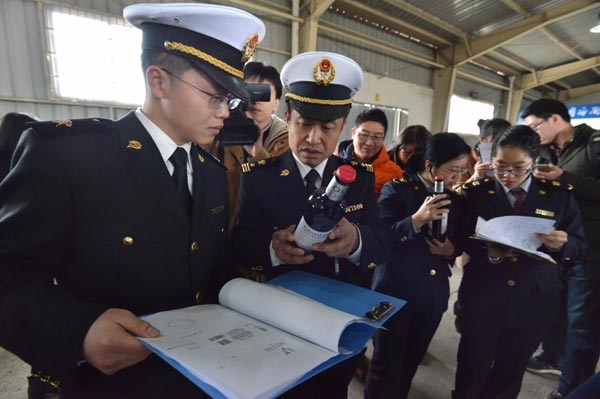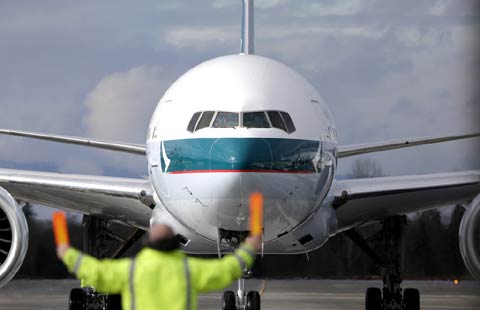'Belt and Road' to energize exports
By LAN LAN/YU RAN (China Daily) Updated: 2015-04-14 07:36
|
 |
|
Wines imported from Spain are inspected at the railway customs in Yiwu, Zhejiang province. Bilateral trade between China and the economies along the Silk Road Economic Belt and the 21st Century Maritime Silk Road stood at 1.45 trillion yuan in the first quarter. [Photo/China Daily] |
China has unveiled the framework and priorities of its Belt and Road Initiatives to enhance regional connectivity and common prosperity. China Daily takes a close look at the development opportunities along the Silk Road Economic Belt and the 21st Century Maritime Silk Road.
Though bleak external demand crimped China's exports during March, robust economic activity along the Belt and Road routes emerged as a silver lining amid the slump.
Companies like Jinko Solar, a solar power company, have already taken advantage of the new opportunities and recalibrated their strategies for overseas markets as exports to the traditional markets were hit by trade disputes and gloomy demand.
Chen Kangping, president of Jinko, said the Belt and Road Initiatives will boost demand in the infrastructure and energy sectors and open a new growth frontier for Chinese photovoltaic firms.
"Trade friction in economies such as Europe and the United States have posed lots of challenges for solar companies ... the initiatives provide a great chance for companies to explore new business potential," Chen said.
His company is deploying its own Belt and Road strategy by actively participating in the development of power plants in countries such as Uzbekistan, Kazakhstan, Jordan and Thailand.
Liu Huaqin, a researcher with the Chinese Academy of International Trade and Economic Cooperation under the Ministry of Commerce, said investment-driven trade growth will become the new trend of investment for Chinese companies.
"Potential for the growth of trade in goods has become very limited. Overseas investments of Chinese enterprises will help in exports of equipment and components, thereby forming new avenues for growth in exports."
Though there is huge potential for growth in this region, the markets are very fragmented and not as uniform as the developed markets, said Liu, adding that companies need to adopt different strategies for each market. "It is a huge challenge," he said.
Bilateral trade with China and the economies along the Silk Road Economic Belt and the 21st Century Maritime Silk Road stood at 1.45 trillion yuan during the first quarter, accounting for about one-fourth of the country's total trade during the same period, the General Administration of Customs said on Monday.
China's exports to the region increased by 10 percent in the first three months, compared with 4.9 percent of the country's total during the same period. The nation's exports to the Association of Southeast Asian Nations and India grew by 20.9 percent and 23.3 percent respectively.
The Belt and Road Initiatives were put forward by President Xi Jinping in 2013 and more than 60 countries along the routes and international organizations have shown interest in participation.
- China plays crucial role in advancing South-South cooperation
- Asian business aviation show opens in Shanghai
- China's fixed asset investment up 13.5%
- Beijing's high-end residential sector faces downward pressure in 2015
- China's property investment up 8.5% in Q1
- Singapore businesses to benefit from the 'Belt and Road'
- China Q1 retail sales up 10.6%
- China's Q1 industrial output up 6.4%

















